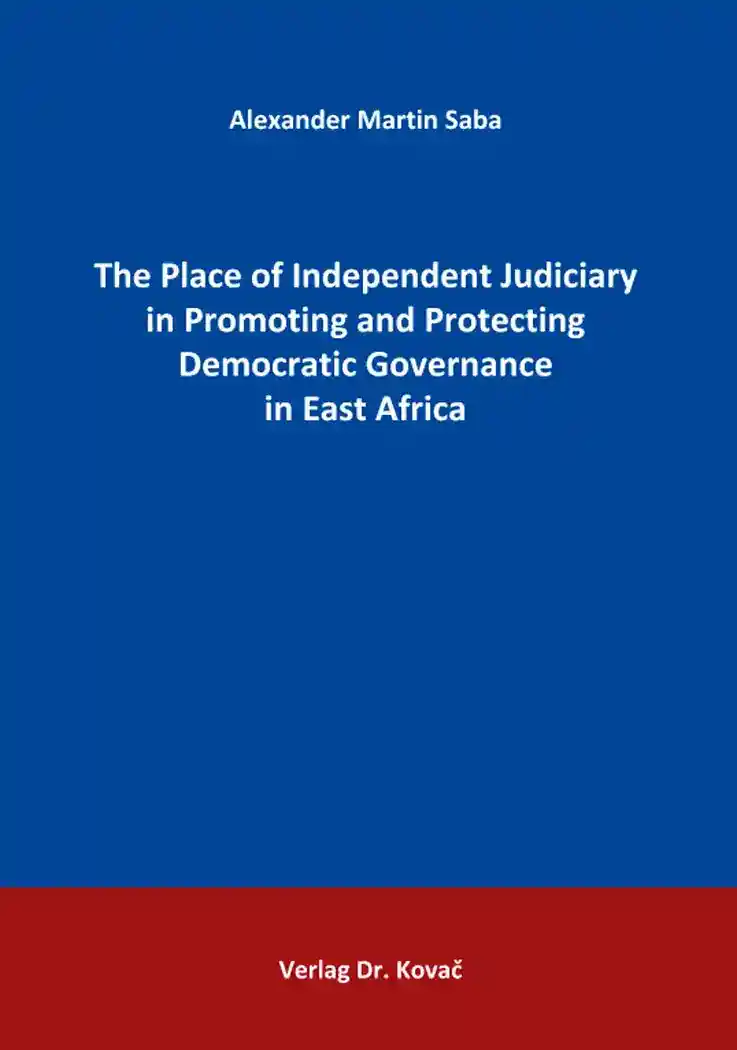Alexander Martin SabaThe Place of Independent Judiciary in Promoting and Protecting Democratic Governance in East Africa
Schriften zum ausländischen Recht, volume 27
Hamburg 2018, 286 pages
ISBN 978-3-339-10032-0 (print) |ISBN 978-3-339-10033-7 (eBook)
About this book deutschenglish
The promotion and protection of democratic governance in three members of the East African Community (EAC), Kenya, Uganda and Tanzania, demand the involvement of many institutions and a solid separation of powers. Judiciary is without any extrapolation an indispensable branch of government that can foster promotion and protection of democratic virtues such as rule of law, human rights, democracy, democratic governance and social justice. It is thus imperative that also judiciaries among the EAC Partner States are structured in a manner that will in fact enable judges to administer justice in accordance with the relevant constitution and the laws. The Community on its part must ensure that its members establish independent judiciaries in accordance with the global standards on fair justice as well as standards set up at the EAC level. This is important in order to give effect to the fundamental principles of the EAC. If all member states are determined to ensure prevalence of democratic governance, the requirement to have independent judiciaries becomes not only momentous but is also important for the survival of the Community.
Though independence of judiciary has been said to be culture specific some countries have in place constitutional safeguards which to a larger extent shape independent judicial institutions than other ones. Kenya provides a good example of an independent judiciary in the world and particularly in Africa. The judiciary in Kenya, after a long time of struggle for a new people’s constitution, ushers horizons of hope of Kenyans towards meaningful protection of democratic governance. To the contrary the judiciaries of Uganda and Tanzania can easily be manipulated due to the fact that the executives and particularly the presidents there are seized with enormous and almost untrammeled powers over the judicial organs especially when it comes to the appointment of the Chief Judges, appointment of judges in general as well as to other executive positions before and after the time of tenure just to mention a few. If chances of manipulation exist, people will definitely lose confidence to, and refrain to resort to courts especially when these judicial bodies have to litigate high profile cases against the government.
The comparative part of this study is based on documentary review and some interviews deployed to different stakeholders in legal fraternity.
Keywords
Democratic GovernanceDemokratieDemokratische HerrschaftEast-African CommunityEast AfricaGerichtsbarkeitGewaltenteilungHuman RightsIndependent JudiciaryJudicial Service CommissionsKeniaLegal Status of JudgesMenschenrechteOstafrikanische GemeinschaftRechtsstaatlichkeitRechtsstellung von RichternRechtswissenschaftRichterausschüsseSoziale GerechtigkeitTansaniaUgandaUnabhängige JustizIhr Werk im Verlag Dr. Kovač

Möchten Sie Ihre wissenschaftliche Arbeit publizieren? Erfahren Sie mehr über unsere günstigen Konditionen und unseren Service für Autorinnen und Autoren.
